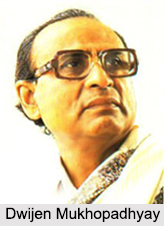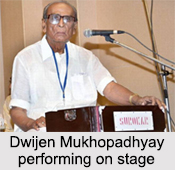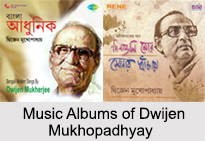 Dwijen Mukhopadhyay was a versatile singer and music director of India, who has been functioning in the field of music for the last six decades. He was one of the foremost exponents of Rabindra Sangeet. Dwijen Mukhopadhyay has recorded more than 1500 songs, of which about 800 are songs of Rabindranath Tagore. He has also directed music in Bengali feature films and composed music for popular Bengali basic songs.
Dwijen Mukhopadhyay was a versatile singer and music director of India, who has been functioning in the field of music for the last six decades. He was one of the foremost exponents of Rabindra Sangeet. Dwijen Mukhopadhyay has recorded more than 1500 songs, of which about 800 are songs of Rabindranath Tagore. He has also directed music in Bengali feature films and composed music for popular Bengali basic songs.
Early Life of Dwijen Mukhopadhyay
Dwijen Mukhopadhyay received his training in music from eminent singers of West Bengal including Shri Sushanto Lahiri, Pankaj Mullick, Santidev Ghosh, Santosh Sengupta, Anadi Ghosh Dastidar and Niharbindu Sen. The year 1944, saw Dwijen Mukhopadhyay making his debut as a professional singer. In 1945, he made his first recording of basic Bengali songs from Megaphone Record Company. The year 1946 was very eventful to him as in that year he not only started to act as an artist of All India Radio (AIR) but also started recording with HMV - Colombia Recording Company. In 1956, he entertained the soldiers of the Indian Army with his songs at Ladakh.
Career of Dwijen Mukhopadhyay
Dwijen Mukhopadhyay was introduced to the folk music of Bengal, and Hindi film music, by the eminent film-music composer Salil Chowdhury. His camaraderie with Salil Chowdhury started in the late `40s through their common association with IPTA.
The duo gave the Bengali audience a number of masterpieces like "Shyamal Barani Ogo Konya", "Klanti Name Go", "Ekdin Phire Jabo Chole", "Pallabini Go Sancharini" and many others. They worked on two poems of Michael Madhusudan Dutt, "Rekho Maa Dashere Mone" and "Ashar Cholone Bhuli"; and came up with rare and beautiful tracks. Later, Dwijen Mukhopadhyay went to Mumbai to work with Salil Chowdhury and recorded duet songs with Lata Mangeshkar for Hindi films like "Honeymoon" (1960), "Maayaa" (1961), "Sapan Suhaane" (1961) and solo playback in "Madhumati".
Dwijen Mukhopadhyay has performed Rabindra Sangeet in noted Bengali films like "Kshudita Pashan" (1960), "Sandhya Raag" (1977), "Kancher Swarga" (1963), "Bon Palashir Padabali" (1973) and "Wheel Chair" (1994). He has worked under distinguished Music Directors like Ustad Ali Akbar Khan and Pandit Ravi Shankar.
 Dwijen Mukhopadhyay has also performed the famous devotional song "Jaago Durga" as a part of the musical play "Mahishasura Mardini" (The Annihilation of the Demon). It is a hugely popular radio programme broadcast by All India Radio (AIR), Kolkata; every year on the auspicious day of "Mahalaya" in Durga Puja. This song is labelled as a signature tune of the entire Bengali speaking community in the world, with a phenomenal popularity for the last 60 years.
Dwijen Mukhopadhyay has also performed the famous devotional song "Jaago Durga" as a part of the musical play "Mahishasura Mardini" (The Annihilation of the Demon). It is a hugely popular radio programme broadcast by All India Radio (AIR), Kolkata; every year on the auspicious day of "Mahalaya" in Durga Puja. This song is labelled as a signature tune of the entire Bengali speaking community in the world, with a phenomenal popularity for the last 60 years.
Dwijen Mukhopadhyay had the privilege to sing before eminent dignitaries like Marshal Josip Broz Tito (President of Yugoslavia), Dr. Sarvepalli Radhakrishnan (President of India), Pandit Jawaharlal Nehru (Prime Minister of India), Indira Gandhi (Prime Minister of India) amongst others. As a member of "Indian Cultural Delegation", he toured Soviet Union and East European countries like Poland, Romania, Czechoslovakia, Bulgaria and Yugoslavia. He also got invited and performed in USA, UK, France, Switzerland, Australia, Canada, Singapore and Bangladesh.
Affiliations of Dwijen Mukhopadhyay
Dwijen Mukhopadhyay was a member of the "Experts Committee" and the "Selections Committee" at Viswa Bharati Music Board in Kolkata, which was responsible to certify the purity and authenticity of Rabindra Sangeet, sung by any artiste all over the world.
 He was a member of the "Expert Committee" of All India Radio (AIR), New Delhi that took national level audition of senior singers to promote them to "Top grade Singers of India". He was the "External Examiner" of the Post Graduate Course in Viswa Bharati University, Shantiniketan.
He was a member of the "Expert Committee" of All India Radio (AIR), New Delhi that took national level audition of senior singers to promote them to "Top grade Singers of India". He was the "External Examiner" of the Post Graduate Course in Viswa Bharati University, Shantiniketan.
Dwijen Mukhopadhyay has created a cultural organisation named "Uttarayani", Kolkata to impart training on Rabindra Sangeet. He is also the President of "Bani Chakra College of Music" in Kolkata.
Dwijen Mukhopadhyay was one who had the rare privilege of celebrating the Birth Centenary of Rabindranath Tagore in 1961 and took active part in the celebration of the 150th Birth Anniversary of the great poet that held in 2011.
Awards of Dwijen Mukhopadhyay
The following are the awards and achievements of Dwijen Mukhopadhyay:
Debabrata Biswas Memorial Award (1982)
Indira Gandhi Award (1991)
Rajiv Gandhi Award (1992)
HMV Golden Disc (1994)
Indian Independence Day Golden Jubilee Award (1997)
Uttam Kumar Award (2002)
Ananda Sangeet Puroskar (2003)
Mother Teresa Millennium Award (2006)
S. D. Burman Award (2007)
Pracheen Kala Kendra Award (2007)
Reliance Big FM Award (2010)
Banga Bandhu Award (2010)
Sangeet Natak Akademi Puraskar (2010)
Padma Bhushan (2010)
Banga Bibhushan (2011)
Death of Dwijen Mukhopadhyay
Dwijen Mukhopadhyay passed away on 24th December 2018, at the age of 91. The maestro, who was suffering from various age-related ailments, is survived by son and daughter.




















